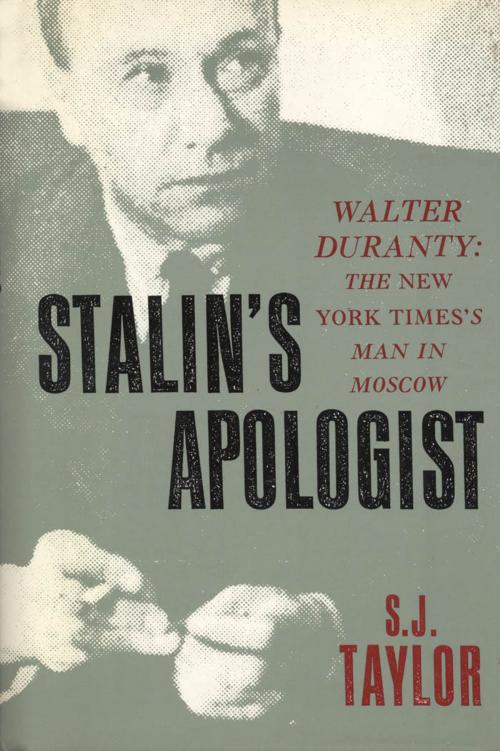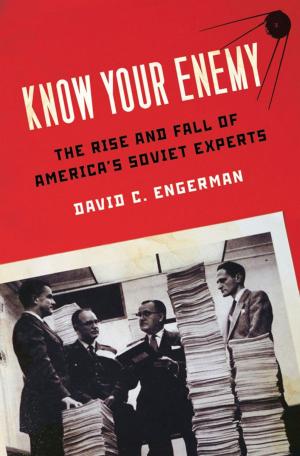Stalin's Apologist: Walter Duranty: The New York Times's Man in Moscow
Nonfiction, History, Asian, Russia, Biography & Memoir, Business| Author: | S.J. Taylor | ISBN: | 9780199923373 |
| Publisher: | Oxford University Press | Publication: | March 29, 1990 |
| Imprint: | Language: | English |
| Author: | S.J. Taylor |
| ISBN: | 9780199923373 |
| Publisher: | Oxford University Press |
| Publication: | March 29, 1990 |
| Imprint: | |
| Language: | English |
Short, unattractive, hobbling about Stalin's Moscow on a wooden leg, Walter Duranty was an unlikely candidate for the world's most famous foreign correspondent. Yet for almost twenty years his articles filled the front page of The New York Times with gripping coverage of the aftermath of the Russian Revolution. A witty, engaging, impish character with a flamboyant life-style, he was a Pulitzer Prize winner, the individual most credited with helping to win U.S. recognition for the Soviet regime, and the reporter who had predicted the success of the Bolshevik state when all others claimed it was doomed. But, as S.J. Taylor reveals in this provocative biography, Walter Duranty played a key role in perpetrating some of the greatest lies history has ever known. Stalin's Apologist deftly unfolds the story of this accomplished but sordid and tragic life. Drawing on sources ranging from newspapers to private letters and journals to interviews with such figures as William Shirer and W. Averell Harriman, Taylor's vivid narrative unveils a figure driven by ambition, whose early success reporting on Bolshevik Russia--he was foremost in predicting Stalin's rise to power--established his international reputation, fed his overconfident contempt for his colleagues, and indeed led him to identify with the Soviet dictator. Thus during the great Ukrainian famine of the early 1930s, which Stalin engineered to crush millions of peasants who resisted his policies, Duranty dismissed other correspondents' reports of mass starvation and, though secretly aware of the full scale of the horror, effectively reinforced the official cover-up of one of history's greatest man-made disasters. Later, he took the rigged show trials of Stalin's Great Purges at face value, blithely accepting the guilt of the victims. He believed himself the leading expert on the Soviet Union, and his faith in his own insight drew him into a downward spiral of distortions and untruths, typified by his memorable excuse for Stalin's crimes, "You can't make an omelet without breaking eggs." Taylor brilliantly captures the full range of Duranty's astonishing life, from his participation in the Satanic orgies of Aleister ("the Beast") Crowley, to his dramatic front-line reporting during World War I, to his epic womanizing and heavy drug and alcohol abuse. It is the bitter, ironic story of a man who had the rare opportunity to bring to light the suffering of the millions of Stalin's victims, but remained a prisoner of vanity, self-indulgence, and success.
Short, unattractive, hobbling about Stalin's Moscow on a wooden leg, Walter Duranty was an unlikely candidate for the world's most famous foreign correspondent. Yet for almost twenty years his articles filled the front page of The New York Times with gripping coverage of the aftermath of the Russian Revolution. A witty, engaging, impish character with a flamboyant life-style, he was a Pulitzer Prize winner, the individual most credited with helping to win U.S. recognition for the Soviet regime, and the reporter who had predicted the success of the Bolshevik state when all others claimed it was doomed. But, as S.J. Taylor reveals in this provocative biography, Walter Duranty played a key role in perpetrating some of the greatest lies history has ever known. Stalin's Apologist deftly unfolds the story of this accomplished but sordid and tragic life. Drawing on sources ranging from newspapers to private letters and journals to interviews with such figures as William Shirer and W. Averell Harriman, Taylor's vivid narrative unveils a figure driven by ambition, whose early success reporting on Bolshevik Russia--he was foremost in predicting Stalin's rise to power--established his international reputation, fed his overconfident contempt for his colleagues, and indeed led him to identify with the Soviet dictator. Thus during the great Ukrainian famine of the early 1930s, which Stalin engineered to crush millions of peasants who resisted his policies, Duranty dismissed other correspondents' reports of mass starvation and, though secretly aware of the full scale of the horror, effectively reinforced the official cover-up of one of history's greatest man-made disasters. Later, he took the rigged show trials of Stalin's Great Purges at face value, blithely accepting the guilt of the victims. He believed himself the leading expert on the Soviet Union, and his faith in his own insight drew him into a downward spiral of distortions and untruths, typified by his memorable excuse for Stalin's crimes, "You can't make an omelet without breaking eggs." Taylor brilliantly captures the full range of Duranty's astonishing life, from his participation in the Satanic orgies of Aleister ("the Beast") Crowley, to his dramatic front-line reporting during World War I, to his epic womanizing and heavy drug and alcohol abuse. It is the bitter, ironic story of a man who had the rare opportunity to bring to light the suffering of the millions of Stalin's victims, but remained a prisoner of vanity, self-indulgence, and success.















